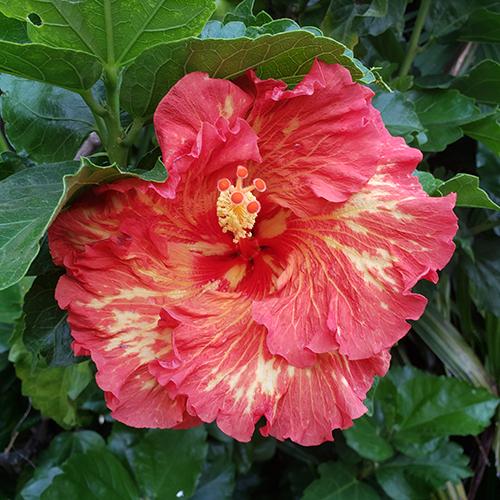
Benefits of Hibiscus
Hibiscus helped save our puppy We found a pedigree Golden retriever for sale for $50 in the local paper. At the time, they were selling

The health benefits of basil pesto, a common food with an uncommon flavor has brought an ancient and mysterious herb to the forefront of our modern culture.
Basil (sweet or common basil), Ocymum basilium, is an annual growing to 3 feet. The stem, like other mints, is quadrangular (square). White flowers appear in whorls in the axis of the leaves. There are several varieties, differing in the size, shape, odor and color of the leaves. The strong aromatic scent is very much like cloves.
A likely Greek derivation is from basileus, a king, because it has been said of basil ‘the smell thereof is so excellent that it is fit for a king’s house.’ Native to India where it is known as Tulsi, it is sacred to Krishna and Vishnu, and is cherished in every Hindu house.
Probably because of its long history of disinfecting and vivifying malarious air and against malarial fevers, it has become cherished as the protecting spirit of the family.
The essential oil also acts as an effective insect repellent, especially for flies and mosquitoes (a carrier of malaria).
Every good Hindu goes to his rest with a basil leaf on his breast. This is his passport to Paradise.
One unlikely derivation of basil is from the Greek basilisk, a fabulous creature that could kill with a look. This theory may be based on a strange old superstition connecting basil with scorpions. It is observed that scorpions do rest and abide under pots in which basil is planted.

Parkinson says of it, ‘being gently handled it gave a pleasant smell, but being hardly wrung and bruised would breed scorpions.’ Superstition went so far as to affirm that even smelling the plant might bring a scorpion into the brain.

Nicolas Culpepper says: ‘Hilarius, a French physician, affirms upon his own knowledge, that an acquaintance of his, by common smelling of it, had a scorpion breed in his brain.
Being applied to the place bitten by venomous beasts, or stung by wasp or hornet, it speedily draws the poison to it. -Every like draws its like.’ The juice of the leaf is applied both topically and internally for this purpose.
The natives of this region used the leaves of poison oak as a poultice for this same purpose, that is, drawing out poisonous snake venom.
In aromatherapy, basil is considered to work more on the mind or emotion than the physical body. Enthusiasm develops when it is used. It enables individuals to know their emotional selves better. Intuition for better decision making is enhanced.
Its use in enhancing appetite has gradually created, in mankind, a zest for life. It should be considered when the mind is the predominant factor in sickness relating to respiration, digestion and the nervous system.
In addition to the health benefits of basil pesto, it is used in medicine and for culinary purposes, especially in France. Although warming to the taste, it is a cooling herb.

A standard infusion (one ounce of leaves steeped in a pint of warm water) has traditionally been employed for indigestion, fevers and flu, kidney and bladder troubles, headaches, cramps, nausea, vomiting, constipation and nervous conditions.

What our family likes it the most for, though – is pesto pizza!
Self-Heal School offers classes in herbal medicine.
Teaching comprehensive holistic education since 1985.
We are currently offering interactive hybrid courses including Herbal Fundamentals, Energy Healing, Aromatherapy and Clinical Herbology
Hybrid means you may choose to participate in each individual class in the hybrid course online or in person.
All of our products are made with love from organic, all-natural and ethically sourced ingredients.
We began making and perfecting our own herbal remedies more than thirty years ago and offer our favorite products for purchase.

Hibiscus helped save our puppy We found a pedigree Golden retriever for sale for $50 in the local paper. At the time, they were selling
Hawthorn Berry Hawthorn is known as the heart herb for its many benefits as a heart tonic. The berry has been a key part of

Can you take herbal supplements to arm your immune system? You probably know that zinc, vitamin D and vitamin C are gotta-have-its. How about herbal

While attending San Diego State College in the early seventies, my work-study job was in the vivarium, a room for keeping and raising animals for